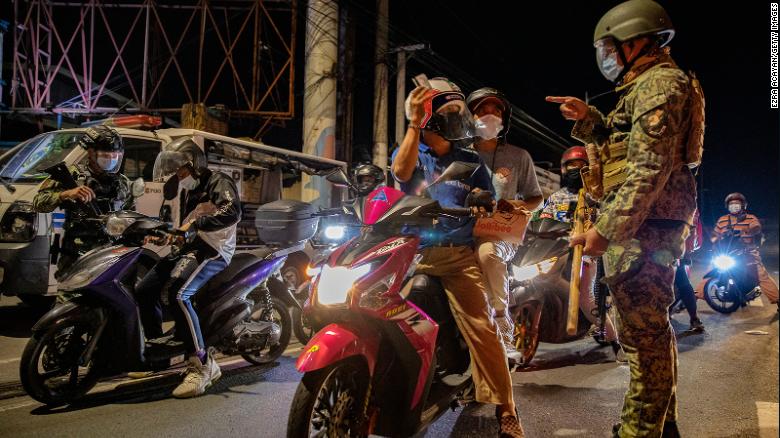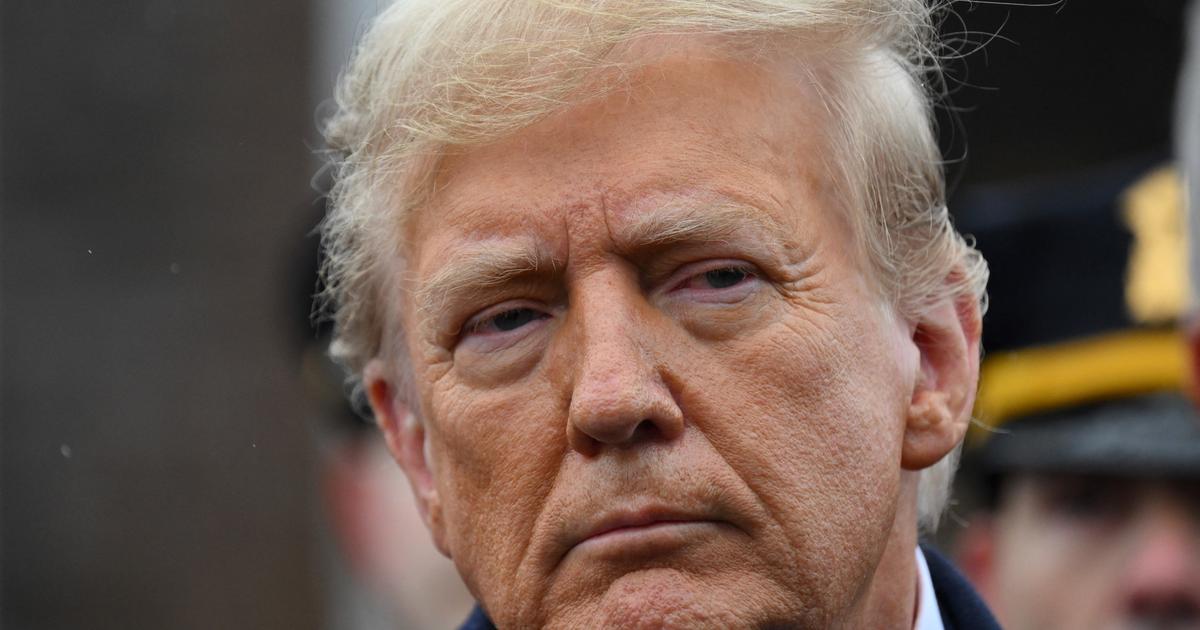Philippines: Quarantine offenders may be shot 0:19
(CNN) -
A man in the Philippines has died after being forced to do 300 squats for violating COVID-19 curfews, making him the latest victim of the country's often brutal approach to enforcing restrictions.
On April 1, Darren Manaog Peñaredondo, 28, left his home in General Trias, a city in Cavite province, which is confined due to the increase in covid-19 cases, to buy water, his family said, according to CNN Philippines, a CNN affiliate.
But the police stopped him and told him to do "squats" about 100 times, according to the report.
The police made him repeat the exercises, eventually doing about 300 repetitions.
A police officer inspects motorists at a quarantine checkpoint on March 29, 2021 in Marikina, Metro Manila, Philippines.
“He started convulsing on Saturday, but we were able to revive him at home.
Then his body failed, so we revived him again, but he was already in a coma, "said his family, according to the report.
Peñaredondo died at 10 p.m., the family said.
The Philippines has one of the highest COVID-19 case numbers of any country in Asia - it has recorded more than 819,000 infections and 14,000 deaths, according to Johns Hopkins University.
Last month, cases in the country increased dramatically, prompting authorities to order the confinement of more than 25 million people, including those from Cavite province.
advertising
The Ministry of the Interior and Local Government and the mayor of the city of General Trias ordered an investigation into Peñaredondo's death, according to the report.
"All police officers found to have violated the law will be prosecuted and punished with the corresponding (administrative) and criminal sanctions," said the department's undersecretary, Jonathan Malaya, in a text message to CNN Philippines.
Peñaredondo's death follows a series of incidents involving brutal police techniques.
In a statement last month, the nonprofit Human Rights Watch (HRW) noted reports that officials had locked five youths inside a dog cage for violating the quarantine.
They also reportedly forced people to sit in the midday sun as punishment for violating the curfew.
José Manuel Diokno, lawyer and founder of Free Legal Assistance Group (FLAG), said it was not legal to lock people in cages or force them to do 300 squats.
“The only penalties that law enforcement can impose for any type of infraction are those found in local law and national law, and we do not have any law that allows people to be locked up in dog cages or to exercise. for long periods of time, ”he said.
A strict approach in the Philippines
Police officers inspect motorists at a quarantine checkpoint on March 29, 2021 in Marikina, Metro Manila, Philippines.
The Philippines has taken a strict approach to containing the coronavirus.
President Rodrigo Duterte has applied his traditional strongman tactics and in April last year he claimed that the police would shoot anyone who violated the restrictions.
I will not hesitate.
My orders are to the police, the military and the barangays: if you get rebellious and fight and your lives are in danger, shoot and kill, ”Duterte said during a speech.
Large numbers of people have been arrested for violating the restrictions in the past 12 months.
Between March and August last year, nearly 290,000 people received a warning or were fined or charged for violating quarantine rules, CNN Philippines reported.
Since Duterte closed the main Philippine island of Luzon on March 16 this year, hundreds of people have been arrested in Manila, HRW said in March.
Philippine authorities argue that a strict approach is needed to control the outbreak in the country.
But Carlos Conde, principal investigator for the Philippines-based HRW, argues that the increasing cases show that the measures have not worked.
Instead, he said the decision to arrest people en masse has likely led to individuals "huddled like sardines" in overcrowded jails, with no social distancing.
The closure orders have also hurt people who need to leave their homes to work, he said, adding that the measures were "very anti-poor."
In its annual report published this week, Amnesty International criticized the Philippine approach, noting that "measures taken by the government to curb the spread of COVID-19 resulted in numerous human rights abuses."
Last month, Duterte defended the use of old military elements in the fight against COVID-19: "You don't need to be a doctor here," he said according to a CNN Philippines report.
CNN has reached out to the official Philippine Information Agency for comment.
Decreased freedoms
A police officer takes photos of suspected curfew violators at a quarantine checkpoint on March 29, 2021 in Marikina, Metro Manila, Philippines.
Brutal policing methods have been a problem for years in the Philippines.
Since Duterte came to power in 2016, thousands have died in the "war on drugs" after the president ordered police to kill anyone they believe was connected to drug trafficking.
But activists say the pandemic has further degraded human rights and freedoms.
According to Conde, the key problem is that the government is treating COVID-19 as a public safety problem, not a health problem.
The outsized roles given to the military and police have only increased the prevalence of aggressive police tactics, he said.
"I believe that the police, the military and the local government have been emboldened to commit further human rights violations during the pandemic," he said.
Diokno, the lawyer, said authorities "have just followed their leader's example," referring to Duterte.
There have been impacts beyond those who were arrested for violating the quarantine.
According to HRW, there was a 50% increase in people killed in the "war on drugs" from April to July 2020 compared to the previous four-month period.
Diokno said that human rights had been "very clearly" degraded by the pandemic.
"Apart from the lives that have been lost, the first victims of the pandemic were democratic rights and freedoms," he said.
Rodrigo Duterte









